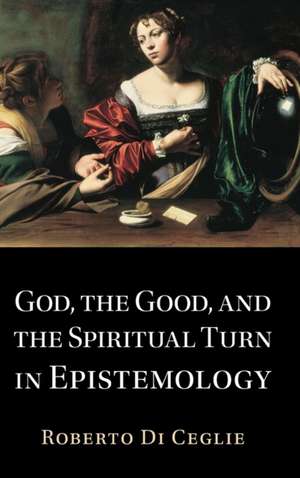God, the Good, and the Spiritual Turn in Epistemology
Autor Roberto Di Ceglieen Limba Engleză Hardback – 17 aug 2022
Preț: 582.88 lei
Preț vechi: 654.92 lei
-11% Nou
Puncte Express: 874
Preț estimativ în valută:
111.54€ • 116.75$ • 92.83£
111.54€ • 116.75$ • 92.83£
Carte tipărită la comandă
Livrare economică 31 martie-14 aprilie
Preluare comenzi: 021 569.72.76
Specificații
ISBN-13: 9781009203555
ISBN-10: 100920355X
Pagini: 350
Dimensiuni: 158 x 235 x 20 mm
Greutate: 0.53 kg
Ediția:Nouă
Editura: Cambridge University Press
Colecția Cambridge University Press
Locul publicării:New York, United States
ISBN-10: 100920355X
Pagini: 350
Dimensiuni: 158 x 235 x 20 mm
Greutate: 0.53 kg
Ediția:Nouă
Editura: Cambridge University Press
Colecția Cambridge University Press
Locul publicării:New York, United States
Cuprins
Part I. Towards the Overcoming of the Lockean View of Faith and Reason: 1. Reformed epistemologists and John Henry Newman as critics of Locke's view of faith and reason; 2. Thomas Reid: philosophy, science, and the Christian revelation; Part II. The Christian Faith As Part of Both the Problem of Inconclusiveness and its Solution: 3. Thomas Aquinas: primacy of faith and autonomy of reason; 4. Rethinking the nature and purpose of debates. Mitchell, practical rationality, religious disagreement, a-rational commitments, and 'quasi-fideism'; Part III. The Spiritual Turn: Why and How to Take it: 5. The spiritual turn: process and some benefits (divine hiddenness, no-fault unbelief, and religious diversity); 6. Comparison with virtue epistemology and reinforcement: more reasons for believers and unbelievers to take the spiritual turn.
Recenzii
'In this fine study, Professor Di Ceglie offers a robust defence of a position that challenges some key modernist assumptions. His central claim is that our moral and spiritual commitments should dispose us to maintain the core beliefs that sustain these, even when faced by apparently strong counter-evidence. By applying insights from Aquinas to contemporary debates, he has provided us with an informed and measured treatment of the subject.' David Fergusson, Regius Professor of Divinity, University of Cambridge
'In this innovative study of our deepest hunches, Di Ceglie cuts through a great deal of epistemological complexity. He makes a case for the 'Spiritual Turn' towards human flourishing and the good over a commitment to evidence-based reasoning. This is fresh and original: Di Ceglie is surely on to something important here.' Mark Harris, Professor of Natural Science and Theology, University of Edinburgh
'An historically rich and novel treatment of important epistemological questions related to the nature of religious and moral conviction.' Duncan Pritchard, UC Distinguished Professor of Philosophy, University of California, Irvine, USA
'Roberto Di Ceglie's book shows that it is from commitment to God and the good that we expect the beneficial orientation of our intellectual life, and not from our initiative of doxastic control in mere epistemology. Modern and contemporary epistemology has been conceived primarily in terms of justification and evidence. The spiritual turn proposed by Di Ceglie is anchored in the thought of Saint Thomas: our religious commitments are so intellectually vital that they are constitutive of our rationality. 'Apart from me you can do nothing' (John 15: 5): this is true also about our intellectual life!' Roger Pouivet, Professor of Philosophy at Université de Lorraine, France
'Roberto Di Ceglie's book shows that it is from commitment to God and the good that we expect the beneficial orientation of our intellectual life, whereas modern and contemporary epistemology has been conceived primarily in terms of justification and evidence. The spiritual turn proposed by Di Ceglie is anchored in the thought of Saint Thomas: our religious and moral commitments are so intellectually vital that they are constitutive of our rationality.' Roger Pouivet, Professor of Philosophy at Université de Lorraine
'In this innovative study of our deepest hunches, Di Ceglie cuts through a great deal of epistemological complexity. He makes a case for the 'Spiritual Turn' towards human flourishing and the good over a commitment to evidence-based reasoning. This is fresh and original: Di Ceglie is surely on to something important here.' Mark Harris, Professor of Natural Science and Theology, University of Edinburgh
'An historically rich and novel treatment of important epistemological questions related to the nature of religious and moral conviction.' Duncan Pritchard, UC Distinguished Professor of Philosophy, University of California, Irvine, USA
'Roberto Di Ceglie's book shows that it is from commitment to God and the good that we expect the beneficial orientation of our intellectual life, and not from our initiative of doxastic control in mere epistemology. Modern and contemporary epistemology has been conceived primarily in terms of justification and evidence. The spiritual turn proposed by Di Ceglie is anchored in the thought of Saint Thomas: our religious commitments are so intellectually vital that they are constitutive of our rationality. 'Apart from me you can do nothing' (John 15: 5): this is true also about our intellectual life!' Roger Pouivet, Professor of Philosophy at Université de Lorraine, France
'Roberto Di Ceglie's book shows that it is from commitment to God and the good that we expect the beneficial orientation of our intellectual life, whereas modern and contemporary epistemology has been conceived primarily in terms of justification and evidence. The spiritual turn proposed by Di Ceglie is anchored in the thought of Saint Thomas: our religious and moral commitments are so intellectually vital that they are constitutive of our rationality.' Roger Pouivet, Professor of Philosophy at Université de Lorraine
Notă biografică
Descriere
An investigation showing that commitments to God and/or the good generate the best possible condition to achieve knowledge.
